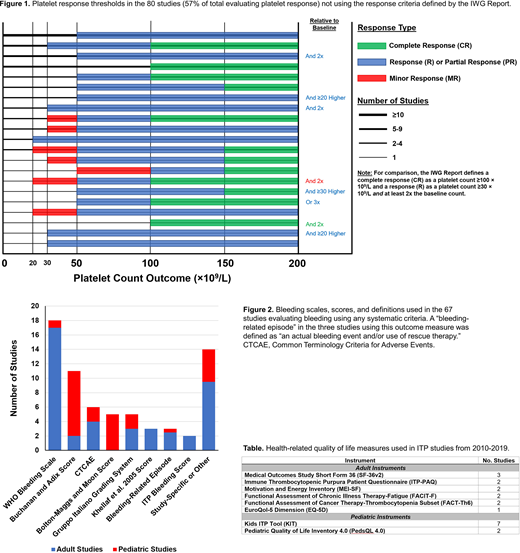Introduction: Despite publication of standardized platelet count response definitions by the immune thrombocytopenia (ITP) International Working Group (IWG) in 2009, there remains considerable variability in the definition of platelet count outcomes across ITP studies. Moreover, there is no widely-accepted bleeding scale, health-related quality of life (HRQoL) inventories, or definition of remission for use in ITP patients, all critical outcome measures not addressed in the IWG Report. This heterogeneity makes comparison of response rates and outcomes between studies challenging. Therefore, to better understand current practices and inform future standardization efforts, we performed a systematic review of ITP studies to characterize how these outcomes have been measured in the decade following publication of the IWG Report.
Methods: We performed a systematic review of PubMed/MEDLINE-indexed manuscripts published from January 1, 2010 through December 31, 2019 that described a platelet count, bleeding, and/or HRQoL measure in reflection of treatment response in adult and pediatric ITP. Following initial search, two authors (H.A. and R.G.) screened each abstract for inclusion, then read each included full text manuscript to collect outcome measures. Interventional studies with ≥10 patients and observational studies with ≥50 patients were included; manuscripts without abstracts and non-English language manuscripts were excluded.
Results:
Studies. The PubMed/MEDLINE search revealed 1562 manuscripts; following abstract screening and manuscript review, 168 manuscripts met inclusion criteria for the study. Of the 168 studies, 110 studies evaluated adults, 41 evaluated children, and 17 evaluated both adults and children; 99 were prospective (including 32 randomized trials) and 69 were retrospective observational studies.
Platelet Outcomes. 141 studies (including 28 randomized trials, 53 non-randomized prospective studies and 60 retrospective observational studies) reported platelet response outcomes and 11 reported platelet count remission definitions. Of the 141 reporting response outcomes, 61 (43%) used IWG definitions and 80 (57%) did not. Of these 80 studies, there were a total of 21 distinct platelet count outcome definition schemes (Figure 1). The majority of randomized trials (22/28, 79%) and other prospective studies (37/53, 70%) did not use IWG definitions; instead, a plurality of these studies used a Plt ≥50 × 109/L to define a treatment response, without definitions for complete, partial, or minor response. Most retrospective observational studies (39/60, 65%), however, used IWG definitions. Of the 11 studies reporting remission definitions, a platelet count of ≥100 × 109/L with or without treatment over a time period of ≥6 months was the most commonly used definition of remission, although a minority of studies used thresholds of ≥50 × 109/L or ≥150 × 109/L.
Bleeding Outcomes. Bleeding outcomes were reported in a systematic fashion in only a minority of studies (67/168, 36%), which used a total of 21 distinct bleeding outcome reporting schemes. A plurality of adult studies used the WHO Bleeding Scale and a plurality of pediatric studies used the Buchanan and Adix Score, Figure 2.
HRQoL Outcomes. HRQoL outcomes were reported in a small minority of studies (15/168, 9%), which used a total of 8 different HRQoL instruments (6 adult instruments and 2 pediatric instruments), Table.
Conclusions: Despite prior attempts to standardize evaluation of platelet response to treatment in ITP, there remains wide variability in the definition of both treatment response and remission. In particular, most prospective and randomized studies published following release of the 2009 IWG report have used study-specific platelet count response thresholds, whereas retrospective observational studies were much more likely to adopt the IWG-recommended platelet response definitions. Despite the fact that ITP is a bleeding disorder and its impact on HRQoL has been well-documented, most ITP studies published in the past decade did not evaluate bleeding in any systematic way and fewer still evaluated the impact of treatment on HRQoL. Further standardization of platelet count, bleeding, and HRQoL outcomes in both pediatric and adult ITP is greatly needed, especially for future randomized trials, to allow for more meaningful comparison of response rates and efficacy between studies.
Al-Samkari:Agios: Consultancy, Research Funding; Argenx: Consultancy; Amgen: Research Funding; Dova: Consultancy, Research Funding; Rigel: Consultancy. Arnold:Novartis: Consultancy, Research Funding; Amgen: Consultancy, Research Funding; Bristol Myers Squibb: Research Funding; Rigel: Consultancy; Principia: Consultancy. Grace:Novartis: Research Funding; Dova: Membership on an entity's Board of Directors or advisory committees; Pfizer: Research Funding; Agios: Research Funding.
Author notes
Asterisk with author names denotes non-ASH members.


This feature is available to Subscribers Only
Sign In or Create an Account Close Modal